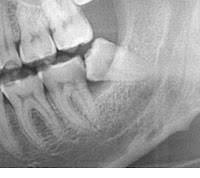Why do we remove wisdom teeth?
Wisdom tooth, as commonly known, is actually the third molar tooth. For most of us wisdom teeth are the last teeth in the
 mouth, usually erupted during the late teens or early 20's. For most of us wisdom teeth are either fully erupted, partially erupted or do not erupt at all.
mouth, usually erupted during the late teens or early 20's. For most of us wisdom teeth are either fully erupted, partially erupted or do not erupt at all.It is common to have some discomfort during eruption of wisdom teeth, epecially the lowers. The most common complaint is pain and swelling. This is normally followed by fever, difficulties in mouth opening, and of course eating. These will normally subside after a few days, however some will require a visit to the dentist or Oral Surgeons for cleaning and a course of antibiotics and painkillers.
Subsequently the teeth might require removal. Since most of wisdom teeth, mainly the lower, are impacted, removal means a minor oral surgical procedure.
The reasons why wisdom teeth have to be removed:
1) recurrent gum infection (pericoronitis)
2) decay (caries)
3) decay of the adjacent teeth
4) cyst developing around the unerupted teeth
5) other reasons deemed removal necessary (during consultation with Oral Surgeon)
Example:
 Close-up photo of infected gums around a partially-erupted third molar tooth
Close-up photo of infected gums around a partially-erupted third molar toothCyst associated with the unerupted third molar
What is third molar surgery
Prior to the surgery, it is very important to have an OPG x-rays taken for a thorough assessment of the anatomy, i.e the shape of the tooth, and the nerve around it.
Third molar surgery is the most common oral surgical procedure performed. This is because most of third molar teeth are partially and unerupted, making it impossible to extract it normally.
As the complexity involved and potential risk, the procedure is better carried out by a qualified Oral and Maxillofacial Surgeon. Majority of surgery is carried out under a local anaesthesia, i.e with 'injections" to numb up the area. Only a small number of cases have to be done under a general anaesthesia due to the difficulties involved.
Prior to the surgery, you can eat / drink as normal.
This is how the surgery is carried out. After the tooth is removed, a few sutures will be applied to the surgical area. This will be removed in a few days. During the healing period, you will be given medications for pain relief.








3 days ago, i've gone through surgery with my third molar (lower right jaw) for now i have a swelling left tonsil that makes me swallow difficulty. is there any connection with the surgery?
ReplyDeleteHi..it is very common to have swelling on the site of the surgery a few days after the surgery. However it will not normally cause any tonsillar swelling. It is best to return to the surgeon to confirm the nature of the swelling
ReplyDeleteNice useful post. Really great writing such a clear and concise article about wisdom teeth and third molar surgery. Thanks and it was lot helpful for my research about the subject. Stay in touch and keep posting more unique posts like the same.
ReplyDeleteregards,
all on 4 dental implants New York City
I agree with Miss Margaret!!!!
ReplyDeleteExcellent post.. i would call it self explanatory
ReplyDeletedentist london
i m also suffering from this. i cant eat/drink/talk or open mouth properly...
ReplyDeleteReading your post today, after a few years of the post, I must say that you do that vision of “change is in the wind”. I want to show my respect by this post. I am very happy know about professional Teeth Cleaning centre service..
ReplyDeleteI am about to do the procedure and am afraid
ReplyDeleteA.A